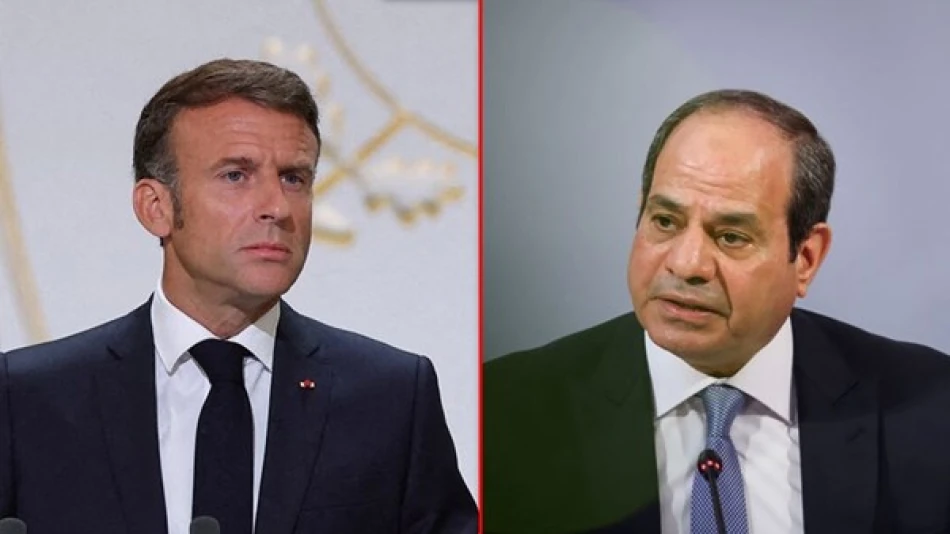
Sisi and Macron Advocate for Comprehensive, Equitable Solution to the Palestinian Conflict
France Signals Major Shift on Palestine as Sisi-Macron Call Highlights Growing European Pressure on Israel
French President Emmanuel Macron has confirmed plans to formally recognize Palestinian statehood during the UN General Assembly in September, marking a significant diplomatic shift that could accelerate European momentum toward Palestinian recognition. The announcement came during a Saturday phone call with Egyptian President Abdel Fattah al-Sisi, as both leaders discussed intensifying mediation efforts for a Gaza ceasefire and broader Middle East peace initiatives.
France Breaks Ranks on Palestinian Recognition
Macron's commitment to announce Palestinian recognition at the UN represents a notable departure from France's traditionally cautious approach to the Israeli-Palestinian conflict. Unlike previous European recognitions that occurred during periods of relative calm, this move comes amid active conflict and growing international pressure on Israel over its Gaza operations.
The timing is particularly significant. France joins a growing list of European nations—including Spain, Ireland, and Norway—that have recently recognized Palestinian statehood, creating a diplomatic cascade that isolates Israel's position within the international community. This coordinated European approach suggests a strategic shift away from the US-led peace process model that has dominated Middle East diplomacy for decades.
Egypt's Mediation Role Under Spotlight
The Sisi-Macron conversation underscored Egypt's central role in current ceasefire negotiations, with both leaders emphasizing Cairo's "intensive mediation efforts" for ending hostilities and securing prisoner exchanges. Egypt's position as the primary Arab mediator has been reinforced by its control of the Rafah crossing and its historical role in previous Gaza conflicts.
However, Egypt's mediation efforts face significant challenges. Previous ceasefire attempts have collapsed due to disagreements over prisoner exchange ratios, the scope of Israeli withdrawal, and long-term governance arrangements for Gaza. The current diplomatic push appears more coordinated internationally, with France's backing potentially providing additional leverage.
Franco-Saudi Initiative Gains Momentum
The leaders also discussed a joint French-Saudi initiative to organize a high-level international conference on Palestinian peace settlement, scheduled for New York in July. This represents an interesting alignment between European diplomatic tradition and Gulf Arab pragmatism, potentially offering an alternative to US-dominated peace processes.
Saudi Arabia's involvement is particularly noteworthy given the kingdom's ongoing normalization discussions with Israel, which have been suspended since the Gaza conflict began. The Franco-Saudi partnership suggests Riyadh may be hedging its diplomatic bets, maintaining pathways to both Israeli normalization and Palestinian solidarity depending on conflict outcomes.
Strategic Implications for Regional Diplomacy
This diplomatic coordination between Egypt and France reflects broader shifts in Middle East power dynamics. Traditional US monopoly over Arab-Israeli peace processes is being challenged by European initiatives and Arab League involvement, creating multiple diplomatic tracks that could either complement or compete with American efforts.
For Israel, the growing European consensus on Palestinian recognition represents a significant diplomatic challenge. Unlike previous periods when European criticism remained largely symbolic, the current wave of recognition carries potential economic and legal implications, particularly regarding trade relationships and international court proceedings.
The September UN General Assembly timeline also creates pressure points for all parties. Israeli leadership will likely intensify diplomatic efforts to prevent additional recognitions, while Palestinian authorities may push for broader international support before the high-profile announcement.
Economic Undercurrents
Beyond diplomatic discussions, the Sisi-Macron call emphasized strengthening bilateral economic cooperation, building on Macron's recent Cairo visit. This economic dimension reflects Egypt's urgent need for international investment and France's interest in expanding Mediterranean partnerships amid shifting global trade patterns.
The economic cooperation framework could provide practical support for Egypt's mediation role, as enhanced French investment might strengthen Cairo's regional influence and diplomatic capacity. This economic-diplomatic linkage has become increasingly common in Middle East relations, where commercial interests often drive political engagement.
Most Viewed News

 Layla Al Mansoori
Layla Al Mansoori






